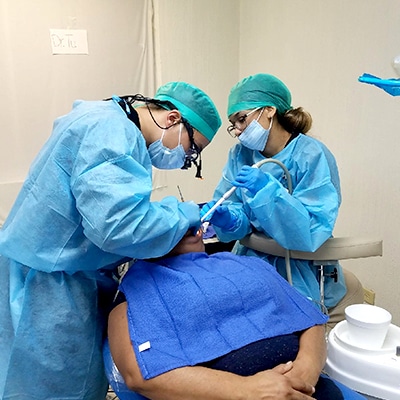
In a world where health consciousness is on the rise, the detrimental effects of smoking are well-documented. Beyond the more obvious threats like lung cancer and cardiovascular diseases, smoking has a profound impact on various aspects of our well-being, including oral health. Your teeth, gums, and overall oral hygiene can become unsuspecting victims of this habit. In this blog post, we embark on a journey to unravel the intricate web of how smoking affects your oral health. From the visible consequences to the underlying physiological changes, we’ll delve deep into the science behind the smoke and explore how a regular visit to a dentist in Katy can transform the oral health of smokers.
The Stealthy Culprit: Nicotine and Its Effects
While the negative health impacts of smoking are manifold, a closer examination reveals that nicotine, the primary addictive substance in tobacco, plays a central role in orchestrating the cascade of detrimental effects on oral health.
Nicotine, a potent alkaloid, operates as the mastermind behind the addictive nature of smoking. When inhaled, it swiftly makes its way into the bloodstream, initiating a series of physiological responses that extend beyond the immediate craving for the substance. One of the most profound effects is the constriction of blood vessels, a process known as vasoconstriction. This vascular narrowing is not limited to the lungs but extends throughout the body, including the oral cavity.
The consequence of this vasoconstriction is a compromised blood flow to various tissues, particularly the delicate structures within the oral environment. Teeth and gums, reliant on a robust supply of blood for nourishment and immune response, find themselves in the crosshairs of nicotine-induced constriction. The restricted blood flow starves these tissues of oxygen and vital nutrients, creating an environment conducive to the proliferation of dental issues.
Stained Teeth: The Obvious Consequence
One of the most visually apparent and immediate consequences of smoking on oral health manifests in the unsightly discoloration of teeth. The culprits behind this disconcerting transformation are the tar and nicotine present in cigarette smoke, which insidiously seep into the enamel—the protective outer layer of teeth.
Nicotine, a notorious culprit in this regard, combines with tar to form a stubborn, yellowish-brown residue that adheres to the surface of teeth. As this residue accumulates over time, it not only alters the color of teeth but also penetrates deeper into the enamel, making the stains more resistant to traditional oral hygiene practices.
The persistent exposure to cigarette smoke exacerbates the staining effect, creating a continuous cycle of discoloration that becomes increasingly challenging to reverse. Teeth, designed to be resilient and gleaming, bear the visible marks of a habit that extends its influence far beyond the initial puff.
Gum Disease: A Silent Menace
While stained teeth may be the visible surface-level consequence of smoking, a more insidious threat lurks beneath the gum line in the form of gum disease—a silent menace that can wreak havoc on oral health.
The compromised blood flow induced by smoking plays a pivotal role in setting the stage for gum disease. Gums, responsible for supporting and protecting the teeth, rely on a robust blood supply to maintain their health and resilience. However, the vasoconstriction triggered by nicotine diminishes this blood flow, leaving the gums vulnerable to the invasion of bacteria.
Gingivitis, the initial stage of gum disease, often goes unnoticed in its early phases. Yet, it is characterized by redness, swelling, and a tendency to bleed easily—subtle signs that should not be ignored. The weakened immune response induced by smoking allows bacteria to flourish, leading to inflammation and the formation of pockets between the teeth and gums. If left untreated, gingivitis can progress into a more severe form of gum disease known as periodontitis.
Periodontitis is a silent menace that can have far-reaching consequences. The inflammatory response triggered by the prolonged presence of bacteria begins to erode the supporting structures of the teeth, including the bone. This can lead to the formation of deep pockets, causing teeth to loosen and potentially resulting in tooth loss.
Increased Risk of Oral Cancer: A Looming Threat
Beyond the visible consequences of smoking on oral health lies a menacing specter – the heightened risk of developing oral cancer. The intricate interplay between the carcinogenic components of tobacco smoke and the vulnerable tissues of the oral cavity creates a perfect storm, making this threat one of the most severe and potentially life-threatening consequences of smoking.
Tobacco smoke is a potent cocktail of carcinogens, including polycyclic aromatic hydrocarbons and nitrosamines, which, when inhaled, directly interact with the cells lining the oral cavity. The cumulative exposure to these harmful substances initiates genetic mutations within the cells, setting the stage for the uncontrolled growth and division characteristic of cancer.
Chronic Dry Mouth: A Breeding Ground for Bacteria
Nicotine, a central component in cigarettes, acts as a vasoconstrictor, reducing blood flow to various organs, including the salivary glands. This constriction limits the production and flow of saliva, resulting in a condition known as xerostomia, or chronic dry mouth. The ramifications of this reduction in saliva reach far beyond the discomfort of a parched mouth.
Saliva plays a multifaceted role in oral health. Its antimicrobial properties help control the growth of bacteria and fungi, preventing them from increasing in the oral cavity. Additionally, saliva assists in neutralizing acids produced by bacteria, contributing to the maintenance of a balanced pH environment that protects teeth from decay. The lubricating effect of saliva aids in the swallowing process and keeps the oral tissues moist, preventing irritation and inflammation.
The Dentist’s Role in Mitigating the Damage
In the face of the multifaceted consequences that smoking inflicts on oral health, the role of a dentist becomes pivotal in mitigating the damage, offering interventions, and providing a path toward oral rehabilitation. The expertise of a dentist in Katy is not only instrumental in addressing visible issues but extends to a proactive stance in preventing potential complications that may arise from the persistent use of tobacco.
Professional Cleanings
Regular dental check-ups offer individuals a vital opportunity to counteract the visible impact of smoking, particularly stained teeth. Professional cleanings conducted by a dentist involve the use of specialized tools and cleaning agents to remove stubborn surface stains, polish the enamel, and restore a brighter, healthier appearance to the teeth. This intervention not only addresses the cosmetic aspect but also aids in the preservation of enamel integrity.
Scaling and Root Planing for Gum Disease
Gum disease, a common consequence of smoking, demands specialized attention. Dentists employ scaling and root planing procedures to remove plaque and tartar buildup both above and below the gum line. This thorough cleaning not only mitigates existing gum disease but also creates an environment conducive to gum tissue healing.
Oral Cancer Screenings
The increased risk of oral cancer associated with smoking underscores the necessity of regular screenings conducted by a dentist. Dentists are trained to identify early signs of oral cancer during routine check-ups, enabling prompt intervention and improving the chances of successful treatment. The diligence of a dentist in conducting thorough oral examinations serves as a crucial line of defense against the looming threat of oral cancer.
Treatment for Chronic Dry Mouth
Chronic dry mouth, a common consequence of smoking, requires a tailored approach for effective management. Dentists may recommend special mouthwashes, prescribe medications that stimulate saliva production, or suggest lifestyle adjustments to alleviate symptoms and prevent further complications. By addressing the root cause and offering targeted solutions, dentists play a crucial role in enhancing the comfort and oral health of individuals grappling with chronic dry mouth.
Smoking significantly affects oral health in various ways. It produces visible effects like teeth staining and also causes hidden physiological changes that weaken the body’s natural defenses. Smokers can combat these challenges by staying informed and visiting the dentist regularly to maintain optimal oral health. This blog urges smokers to prioritize investing time, attention, and regular dental check-ups. If you live in Katy, visit us or schedule an appointment with our dentists for a better understanding of your oral health.










